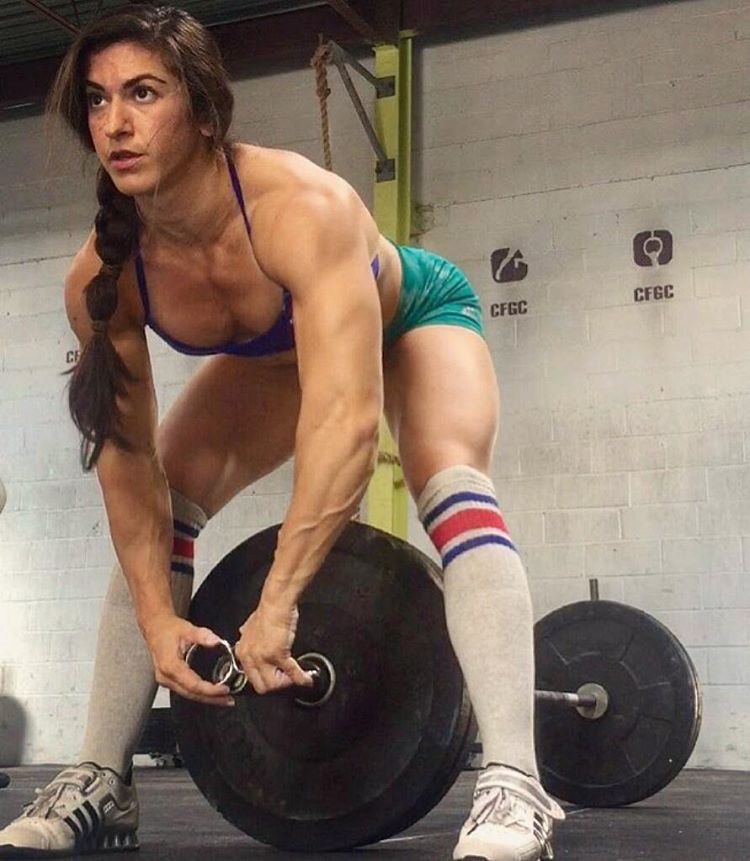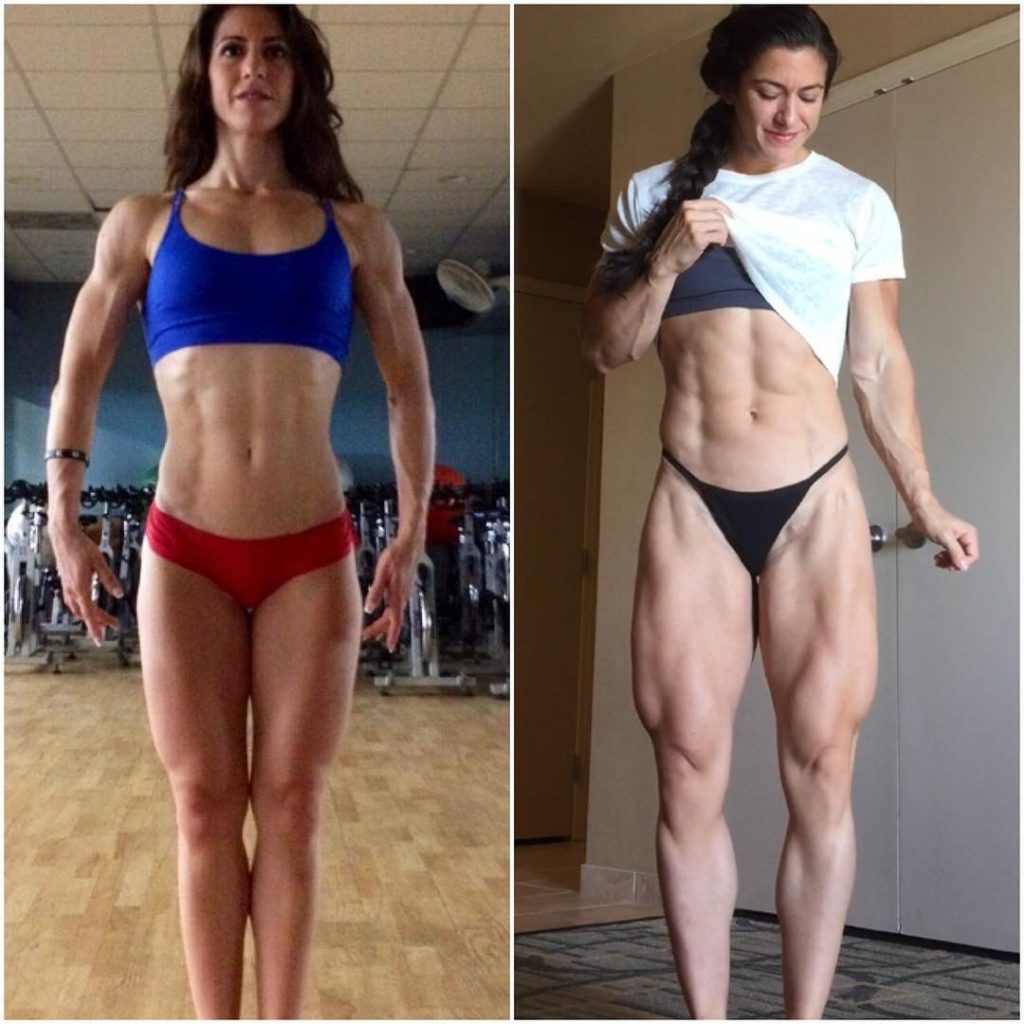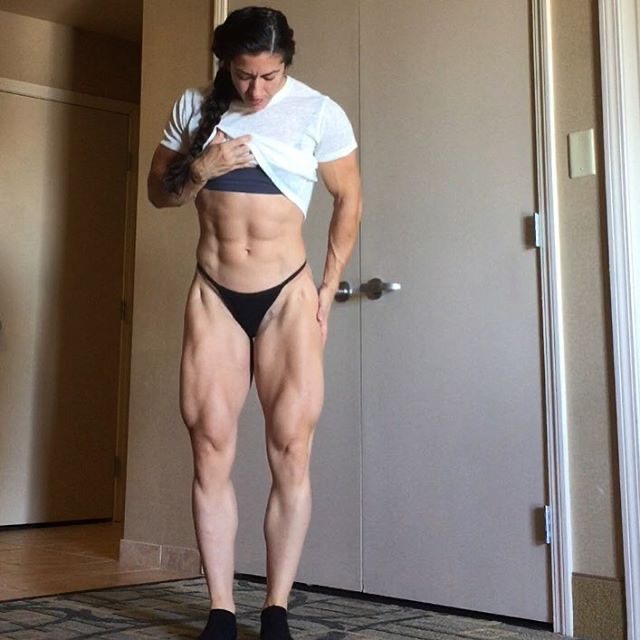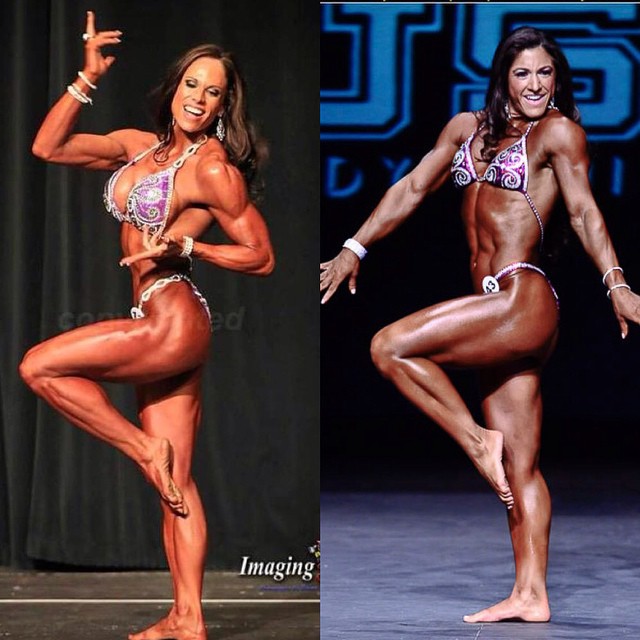By Elizabeth Narins
Gina Policastro, 28, is a Queens, New York-born earth science teacher who works at a high school in Manhattan. She’s also an eight-time National Physique Committee competitor who’s placed 12th in three different national competitions, and is currently training for two upcoming shows.

Cosmopolitan.com recently talked to her about what it takes to go from the classroom to the stage in a bikini and how she sculpts her body leading up to competitions.
Have you always been interested in fitness?
I always liked being active. As a kid, I did dance and gymnastics, and then cheerleading in high school and college. When I was in high school, I had a boyfriend who liked to work out, so I would go to the gym with him and his friends about twice a week. I think we just figured things out using pictures on the machines. I had no formal training, just picked things up along the way.
What made you take it one step further to start competing?
When I was a junior in college, I worked at a shoe store with a woman who was really fit, and she referred me to her trainer. I thought I knew how to work out I think everyone does, at least until someone shows them the right way. Still, I was like, “Great! I’ll try it.” I’m one of those. I’ll try it.
I liked having someone push me. During that first year, my trainer said I had a lot of potential and suggested I consider competing. I remembered watching Miss Fitness America when I was a kid. It had all the glamour the evening gown, the hair, the makeup of Miss America competitions, but everyone’s talent portion is a fitness routine. So I’d always kind of wanted to compete.

But I actually took a break from working out after college. I met someone who was very controlling and he got jealous when I spent time at the gym. He would come with me, and if someone said, “Wow, you lift heavier than most guys here,” (which is something that really happened), he’d be like, “Why are you talking like that? Who is he? How does he know you?” At some point, I just stopped training altogether and stopped working out.
When I was 23, we got married. But things went from bad to really bad to “I’m just not going to take it.” I got divorced six months later and Googled “best body building gym on Long Island” [where I lived].

I was terrified to walk in, but when I did, I was matched with a trainer who competes. I thought I’d have to train for at least a year, but she said I could do it in 12 weeks because I was already very lean.
How did your fitness goals and routine change to train for competition?
When I used to go to the gym, I would run on the treadmill for, like, 10 minutes, because I hate running. Then I would do the thigh machine and use 10-pound dumbbells to do biceps and triceps exercises. Nothing heavy at all. My trainer would push me to do more.

I started working out one body part for one hour per day: Shoulders on Mondays; arms on Tuesdays; back on Wednesdays; cardio (on an elliptical, step mill, or arc trainer) and abs on Thursdays; legs on Fridays; calves, abs, and cardio on Saturdays; and rest on Sundays.
Six weeks before the competition, I add up to an hour of cardio in the morning and another 30 minutes of cardio after I do my hour of training in the evening. For me, the intensity of cardio doesn’t kill me; it’s the boredom. It’s like being in a hamster wheel. I have an iPad, and I watch a movie so it’s not terrible. It’s doable.
What kind of exercises do you do? Mostly machines or free weights?
I use a lot of free weights, because they engage your core more than machines, which enables you to hit multiple muscle groups with one exercise.
For legs, I do use some machines like the leg press and Smith machine. I also do free-standing squats.
For arms, I use the cable machine to work my biceps and triceps. For abs, one of my favorite moves is to lie on a bench and lift both legs straight up into the air. I do crunches between sets of other exercises, which keeps my heart rate up. For all exercises, I usually count out three sets, then on the fourth set, I’ll go until my body gives out. When you get caught up in counting reps, you stop when you’re finished [with the reps], and you can’t really make progress that way.
Sometimes I’ll go online to see what athletes are doing, and sometimes I add that into my repertoire.
You’re currently training for two competitions in the spring. But you also work full-time as a teacher. How do you find the time to work out up to 2.5 hours per day?
My parents got me a spin bike for Christmas, [so] I can just roll out of bed and do my cardio. School ends at 3 p.m., so I go to the gym on my way home. I used to coach softball until 5 p.m. a few days a week, but even then I’d go straight to the gym to train.

When do you have time to eat? With such a strenuous workout routine, are you constantly starving?
I usually wake up hungry, which is a good thing because it tells me my metabolism is working and I’m burning enough calories to consume the amount that I’m eating. But I eat a lot throughout the day.
Because I’m training for a competition, I follow a diet plan, which is very different than just normally eating for everyday life. I prepare all my meals ahead of time, usually on Sundays. If I don’t have time to cook, say, vegetables, I buy the frozen ones and microwave them. There’s time in the day.
I always bring food with me. On a typical training day, I wake up and do my hour of cardio on an empty stomach. Then I eat five egg whites and one cup of oatmeal, and go to school. My first break is about 10:30 a.m., so I’ll eat my second meal (4 or 5 ounces of chicken, one cup of brown or white rice, and a green salad with oil and vinegar dressing). I do actually weigh it now, because I have shows coming up, but not during the year when I’m not competing.

Around 3 p.m. before I leave school to go train, I’ll eat another meal, like 4 to 5 ounces of turkey and the same amount of carbs, like a sweet potato, plus a vegetable like string beans. I don’t count those. My coach will say if it’s, like, asparagus, you should count how many sprigs. But I’m not counting asparagus or lettuce or string beans. [Laughs.] That’s crazy.
I get two meals after that: Usually, one of them is chicken and a carb, and then the last one is eggs and oatmeal again. So five or six meals during the day.
The goal is to lose body fat and hold onto the muscle, which changes how your body looks, regardless of the number on the scale. The hard part is that these are competing forces.
So how do you do it?
You increase your cardio and the intensity of your workout, and cut back on calories. It’s not the healthiest thing for you, and I wouldn’t suggest anyone live like this year-round. What you see when you see someone’s stage photos is hard work and dedication, but it’s certainly not the epitome of health.
The state in which people go onstage is not for walking around in everyday life. That’s why I pick shows that are scheduled close together. For the rest of the year, I’ll try to stay in a healthy place, which is usually 10 to 15 pounds heavier than what I weigh when I go onstage.
In previous years, I kind of took it a little too far. I did four shows pretty much back to back, but my body was just like, “Screw you, I’m not doing this anymore.”
I actually was looking worse, because my body was tired. If you deprive yourself of foods you’re used to having for the 12 weeks before a show, it’s OK. But if you do it for six months straight, you start to think about food all the time. I was moody all the time, and I didn’t like the person I was. I couldn’t ever enjoy dinner with my family or on holidays or at friends’ birthdays. I’d be like, “No, I brought my food.”
Do you ever get bored of eating very plain foods?
Yeah. I’m a foodie and I don’t like to diet. I like brownies; I like cookies. I’ve always been able to eat what I want and not gain weight, and that’s not the case anymore. The diet is hard, and it does mentally break you. It’s amazing how strong your cravings are. I crave pancakes! And chocolate chip cookies. Those are my two big ones.
How do you resist it? And also, in school, aren’t you around tons of baked goods and all that?
You must have incredible self-control. Do you ever give in to temptation?
When I was doing four shows a year, I was living with my parents and they would have regular food in the kitchen. In the middle of the night, I would wake up and binge-eat a tub of butter pecan ice cream or cookies or cake. For the moment, it was so satisfying, but afterward, I felt so guilty and horrible. I just yo-yoed like that for a while until I told myself, “If this is what I’m going to do, then I have to quit.” I took a season off.
A lot of girls who train for competitions develop eating disorders from this, and I think I definitely did that to myself. You see the beautiful people in magazines, on TV, and on Instagram, where everyone posts pictures of their abs. You want to look like them, but in reality, most of these people don’t have defined abs year-round. I don’t have them year-round.
Now I’m in my fourth year and I love how I look. I can’t believe I did such crazy things to achieve this look for a stage for only a couple minutes. Now I don’t weigh food during the year. If I want a chocolate chip cookie, I eat it, and the world doesn’t end.
Is it really just a few minutes onstage? What’s a competition like?
You pick your division: bikini (the least muscular), figure, women’s physique, or bodybuilding (the most muscular). I compete in women’s physique. It’s more muscular than figure, and we don’t have to wear heels onstage.
Then you’re separated into groups by height. Everyone in your height class comes onstage one at a time and performs some mandatory poses for 60 seconds. The point is to showcase yourself and your personality a dynamic intro can help you stand out.
Posing is a beautiful thing for people who want to perform and be onstage; it’s a great outlet. I had my poses choreographed by a competitor who lives in California. I just love her stuff, so I was like, “Can you make me a routine, please?” So we Skyped and I loved what she put together for me. It’s like I’m dancing on the stage.
Judges look at your body for symmetry, muscularity, and definition. After everyone does their poses alone onstage, everyone comes out and judges (usually fifty-fifty male-female) do “callouts,” where they ask groups of girls who stood out to step forward and do a pose simultaneously for comparison.
The judges rank you, so your success depends on your competition. You don’t know who you’re up against until you get to the competition. You win a trophy if you place in the top five. If you place first in national competitions, you can compete on the professional level, where winners receive cash prizes. I’d like to get there. I’ve done eight competitions so far, and placed 12th in national competitions three times.
During my first two years, I took losing a little bit worse. At the end of the day, I’m not getting paid to do it. It’s a hobby that’s supposed to be for fun.
How stressful is it to stand basically naked among your competitors?
Backstage it can be stressful. You are a little bit vulnerable at that point because you’re going out to show everything that you’ve worked for. I bring a book and stayed covered up backstage so I don’t start to question myself.
Onstage though, it’s different. My first time onstage, I don’t even remember posing. I think I just went so fast because I was so nervous. I would always get nervous in figure competitions when you have to walk onstage in heels and a bikini.
There is actually a lot of camaraderie there though. Everyone feels the same way. Some people just have a better game face and don’t show it as much.
Do your parents see your competitions? What do they think when they see you onstage in a bikini?
They’ve come to my shows. I was a stick my whole life, so when they see me, they’re like, ‘Oh my god.” My mom thinks it’s cool. My dad has always been an “if it makes you happy, do it” sort of person. They’re coming to my upcoming show. I’m excited to show them my routine and the work I’ve been putting in.
Do you ever feel objectified when you get up onstage?
When I’m onstage and I’m getting judged for my body, that’s my goal, that’s what I’m there for. If I felt uncomfortable with it, I’d take a step back and evaluate if it’s something I really want to be doing. You can always just work out to work out and not get on a stage.
Have you ever been judged offstage for the way your body looks?
I’ve never really had a negative response in person, but I’ve gotten a lot of “ew that’s so gross,” on social media. I know I’m not everybody’s look I’m fully aware I’m not going to appeal to everyone. But I like the way I look, so I’m fine with it. I have a boyfriend; he likes how I look.
Does he compete too?
He doesn’t compete. He’s one of those people who likes to work out as if he’s going to compete and eat meals as though he’s going to compete, but he has zero desire to get onstage.
What kind of questions do you get at school about your competitions? Like when your students ask?
I don’t walk around flexing, but if I wear something that is sleeveless, you can tell I work out. Everyone’s initial reaction is, “Oh my god.”
I’ll always tell them about my competitions on the first day of school and tell them to get out all their questions. They actually come up with very good, thoughtful questions, but I also get some like, “Can you flex for me?” “How much do you lift?” and, “How much do you weigh?”
They Google everything, so if I don’t tell them what I do, they’re just going to find it and make their own assumptions as to why their teacher is on a stage in a bikini. Some of them follow me on social media and ask about my competitions or for advice on bulking up and supplements at GNC. So many of them have asked me to work out with them that I’m going to start a fitness club this spring. I’d like to take it to other schools too.
Are there any major misconceptions you think people have about women’s body competitions?
One of the things that bothers me the most is when people look at me and they’re like, “Oh, you’re a personal trainer, right?” or, “You’re a gym teacher, right?” I don’t think people see competitors as people who have other professions. But the majority of us are accountants, own businesses, work in real estate, or do something else in addition to this. It’s a hobby for most people. I’m not sleeping until noon, working out, and eating my meals all day. We’re not totally consumed with ourselves. We have families. We have jobs. I work full-time, and I’m in night school to get my graduate degree. I may take selfies at the gym, but I do other things and my day is jam-packed.
It seems like you’ve really figured out what works for you. What’s your best advice for other people who want to get into shape?
Take any article you read and any video you watch as a suggestion, because what works for one person isn’t going to necessarily work for you. I think the best advice is to be consistent. If you practice the same habits for a year or two, then you get to really see what works, what habits and foods gives you results. People don’t give themselves enough time.
After your last competition this year, when everything you’ve trained for is behind you, what are you going to do?
I’ve made the mistake of eating whatever I wanted after competition. I gained, like, 20 pounds overnight. Now, I always hit up a pancake spot after the show. I’ll order three different kinds of pancakes, and they look at me like, “You sure you just don’t want to order one type of pancake?’ And I’m like, “No, no, just bring it all out at once!”
I’ll eat whatever I want the following day. But after that, I’ll go back on a less-crazy version of my training diet plan. I’ll make my chicken, salad, and I’ll keep my diet clean with just one food I really want each day. Then, I slowly break away from the diet plan one meal at a time. This year, I also want to treat myself to a trip, because I haven’t had a chance to get away for anything but competitions.
Courtesy of: Cosmopolitan.com





